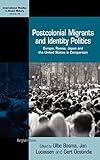Postcolonial Migrants and Identity Politics : Europe, Russia, Japan and the United States in Comparison / ed. by Ulbe Bosma, Gert Oostindie, Jan Lucassen.
Material type: TextSeries: International Studies in Social History ; 18Publisher: New York ; Oxford : Berghahn Books, [2012]Copyright date: ©2012Description: 1 online resource (278 p.)Content type:
TextSeries: International Studies in Social History ; 18Publisher: New York ; Oxford : Berghahn Books, [2012]Copyright date: ©2012Description: 1 online resource (278 p.)Content type: - 9780857453273
- 9780857453280
- Emigration and immigration -- History -- 20th century -- Case studies
- Emigration and immigration -- Political aspects -- Case studies
- Group identity -- Case studies
- Identity politics -- Case studies
- Immigrants -- Case studies
- Postcolonialism -- Case studies
- HISTORY / Social History
- History (General), Refugee and Migration Studies
- 325 23
- JV6032 .P67 2012
- online - DeGruyter
| Item type | Current library | Call number | URL | Status | Notes | Barcode | |
|---|---|---|---|---|---|---|---|
 eBook
eBook
|
Biblioteca "Angelicum" Pont. Univ. S.Tommaso d'Aquino Nuvola online | online - DeGruyter (Browse shelf(Opens below)) | Online access | Not for loan (Accesso limitato) | Accesso per gli utenti autorizzati / Access for authorized users | (dgr)9780857453280 |
Frontmatter -- Contents -- List of Figures and Tables -- Abbreviations -- Introduction: Postcolonial Migrations and Identity Politics: Towards a Comparative Perspective -- Chapter 1 Postcolonial Immigrants in France and their Descendants: The Meanings of France’s ‘Postcolonial Moment’ -- Chapter 2 Postcolonial Migrants in Britain: From Unwelcome Guests to Partial and Segmented Assimilation -- Chapter 3 Postcolonial Migrants in the Netherlands: Identity Politics versus the Fragmentation of Community -- Chapter 4 Postcolonial Portugal: Between Scylla and Charybdis -- Chapter 5 Return of the Natives? Children of Empire in Post-imperial Japan -- Chapter 6 Postcolonial Immigration and Identity Formation in Europe since 1945 The Russian Variant -- Chapter 7 The Puerto Rican Diaspora to the United States: A Postcolonial Migration? -- Bibliography -- Notes on Contributors -- Index
restricted access online access with authorization star
http://purl.org/coar/access_right/c_16ec
These transfers of sovereignty resulted in extensive, unforeseen movements of citizens and subjects to their former countries. The phenomenon of postcolonial migration affected not only European nations, but also the United States, Japan and post-Soviet Russia. The political and societal reactions to the unexpected and often unwelcome migrants was significant to postcolonial migrants’ identity politics and how these influenced metropolitan debates about citizenship, national identity and colonial history. The contributors explore the historical background and contemporary significance of these migrations and discuss the ethnic and class composition and the patterns of integration of the migrant population.
Mode of access: Internet via World Wide Web.
In English.
Description based on online resource; title from PDF title page (publisher's Web site, viewed 25. Jun 2024)


